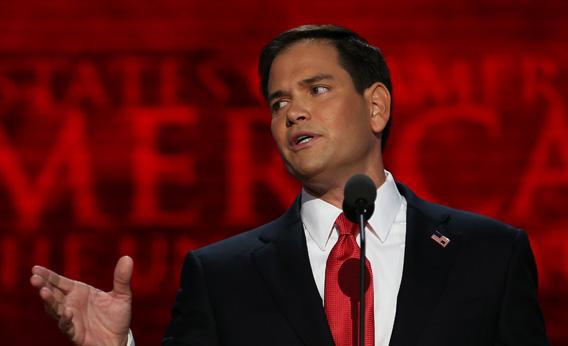You can judge a political party’s self-confidence in part by how it treats its past leaders. Democrats spent all of the George W. Bush years waxing nostalgic about the good old days of the Clinton administration. Barack Obama’s election, by contrast, triggered mass amnesia in conservative circles about the name, identity, and partisan affiliation of his predecessor. To hear Republicans tell it, American politics ended in January 2001, only to suddenly shake back to life in February 2009 with a Kenyan socialist in the White House and the sound economy Ronald Reagan built lying in shambles.
But last night Florida Sen. Marco Rubio made clear in words what those of us who’ve been watching Republican deeds have long suspected: The party deeply yearns not for new ideas but for George W. Bush’s ideas. Bushonomics is back.
This is a huge shift from the first few years of Obama’s presidency. The staggering budget deficit racked up in Fiscal Year 2009 as the joint consequence of economic collapse, TARP, and the Obama stimulus electrified GOP rhetoricians. Suddenly Dick Cheney’s bold proclamation that “Reagan proved deficits don’t matter” was forgotten. Compassionate conservatism was out, and scolding conservatism was in. Paul Ryan’s mastery of algebra impressed many.
America, we learned from the scolds, was polarized between makers and takers, with somewhere between 60 percent and 47 percent of the population living high on the dole while put-upon “job creators” had their wealth-creating talents sapped away by the tax man. American Enterprise Institute president Arthur Brooks reconceptualized economic policy as culture war, copies of Atlas Shrugged and The Road to Serfdom flew off the shelves, and at its 2012 nominating convention the GOP staged an orgy of self-congratulation for America’s prosperous business owners who, yes, dammit, built their companies all on their own with zero help from public school teachers or Big Government roads.
It didn’t go well.
Like any party in defeat the GOP now must rebrand, and in rebranding, the party has decided to look backward to George W. Bush. Louisiana Gov. Bobby Jindal seems to have realized this before others. “Balancing the government’s books is a nice goal, but that is not our primary objective,” runs his now-standard speech on repositioning the party. “We must not become the party of austerity. We must become the party of growth.”
Speaking last night, Rubio made the point even more explicit. He denounced Obama’s “obsession with raising taxes” and said the real solution to the budget deficit was economic growth. Simply raising the real GDP growth rate to (an unrealistically high) 4 percent of GDP, he observed, “could reduce our deficits by almost $4 trillion dollars over the next decade” while creating “millions of middle class jobs.” Thanks to this super-growth, “the choice doesn’t have to be either higher taxes or dramatic benefit cuts for those in need.” Instead growth will “create new taxpayers … so our government can afford to help those who truly cannot help themselves.”
This is an approach with a proud pedigree in Republican politics. Some call it supply-side economics. Some call it compassionate conservatism. Either way, the point is the same: Republicans don’t think poor people are moochers and looters unfairly soaking the rich. Rather, the best way to help the poor is to cut taxes on the rich. Rubio is even trying to steer the party back to Bush’s stance on immigration.
On the economic front, calling this a different policy direction from the Romney/Ryan, pseudo-Randian version of the GOP would be an exaggeration. It’s not that Bush-era Republicans didn’t care about the deficit and Boehner-era Republicans did. It’s that Boehner-era Republicans pretended to care about the deficit while Bush-era Republicans pretended to care about the poor. Either way, the actual policy agenda of low taxes at any cost remained about the same. But points of rhetorical emphasis do matter.
Bushonomics opened the door to a particular kind of bipartisan compromise—social spending programs would be expanded or better funded in exchange for conservative-friendly structural reforms. That was the story of the No Child Left Behind education reform law and the 2003 Medicare bill adding prescription drug coverage for senior citizens. The austere, scolding Ryan version of Republicanism, on the other hand, encouraged a different kind of bargain: a deficit-focused one in which Democrats offered lower spending in exchange for higher taxes. Unlike Bushonomics, which produced compromise during the Bush years, the quest for the deficit grand bargain has brought America nothing but chaos and misery, as we lurch from one crisis to another.
A back-to-Bush approach—though Republicans will deny that’s what they’re doing—would in this sense be a welcome development. Low taxes, especially on high-income people, is what Republicans really care about in economic policy. They care deeply and profoundly about it. One can agree or disagree with them about that, but as long as it remains their key policy priority, it’s much healthier for America if they put that front and center. Several years of deficit-talk from the GOP have tended to confuse the issue—killing their brand politically while encouraging Democrats to waste time on pursuit of deals the Republicans will never embrace.
